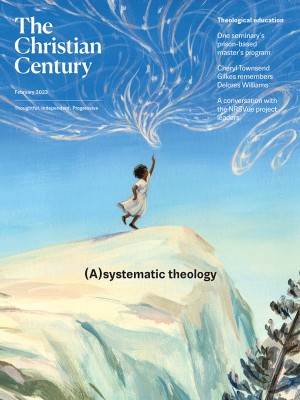The scandal of the anti-intellectual mind
Why are so many Christians opposed to science and captivated by conspiracy theories?

Richard Hofstadter’s Pulitzer Prize–winning book Anti-intellectualism in American Life was published 60 years ago this month. In it, the historian suggests that American culture has recast the role of the intellect as a vice instead of a virtue, diminishing expertise while glorifying the plain sense of the common person. Anti-intellectualism, he writes, is “a resentment . . . of the life of the mind and of those who are considered to represent it; and a disposition constantly to minimize the value of that life.” Hofstadter saw political, business, educational, and religious leaders prioritizing practical success over the life of the mind.
Hofstadter distinguished between intelligence and intellect. He described the former as “an excellence of mind that is employed within a fairly narrow, immediate, and predictable range.” It’s a quality that animals and humans can both possess. Intellect, on the other hand, is that “critical, creative, and contemplative side of mind” that “looks for the meanings of situations as a whole.” It’s a “unique manifestation of human dignity.”
Read our latest issue or browse back issues.
In contemporary life, we easily conflate intellect with mere access to unlimited information. Citing facts from the internet can make one sound intelligent. Meanwhile, anti-intellectualism has metastasized across large swaths of American culture. Many Americans today—including many Christians—are decidedly hostile to scientific authority, just as they’re enamored with conspiratorial thinking. Contempt for experts is on the rise, matched only by a growing willingness to dismiss truth and embrace disinformation. Widespread derision of knowledge is commonplace. Ideologically driven book-banning efforts seek to close the minds of our youngest generation.
Hofstadter saw American evangelicalism as a chief culprit in America’s lack of intellectual rigor. Mark Noll pondered similar issues 30 years later in The Scandal of the Evangelical Mind. Noll explores the history of evangelicalism and why so many adherents fail to sustain a serious intellectual life. Mainline Protestants and Roman Catholics are hardly exempt from treating the life of the mind lightly in their own pulpits and pieties. But as Noll points out in the preface of a new edition to the book, “white evangelicals appear as the group most easily captive to conspiratorial nonsense, in greatest panic about their political opponents, or as most aggressively anti-intellectual.”
Cultivating the life of the mind has been fundamental to Christian communities for centuries. So why is critical thinking in such short supply among believers today? Why, to borrow John F. Kennedy’s words, do we so “enjoy the comfort of opinion without the discomfort of thought”?
“God gave us brains and we are supposed to use them,” former senator John Danforth said, reflecting on the words, “love the Lord your God with all . . . your mind” in Matthew 22:37. “Doing God’s work requires more than a big beating heart.” Dianoia, the Greek word Matthew uses for “mind,” can be parsed as dia (side-to-side, evaluating, weighing) and noieo (to use the mind). Thorough reasoning that’s disciplined, analytical, curious, and hungry for truth is indispensable to loving God.
Someone asked me recently what I think Christianity’s biggest challenge is in the coming decades. I told her that thinking Christians have to get to work. We need to reclaim Christianity from the politicized moorings of a mindless caricature of faith that bears little resemblance to the Jesus of the Gospels. So long as Jesus functions mostly as a hood ornament for many Christians—Russell Moore’s image from his most recent book—we can expect growing disillusionment among those who thought faith meant being transformed by the renewal of our minds, not being conformed to this world.





